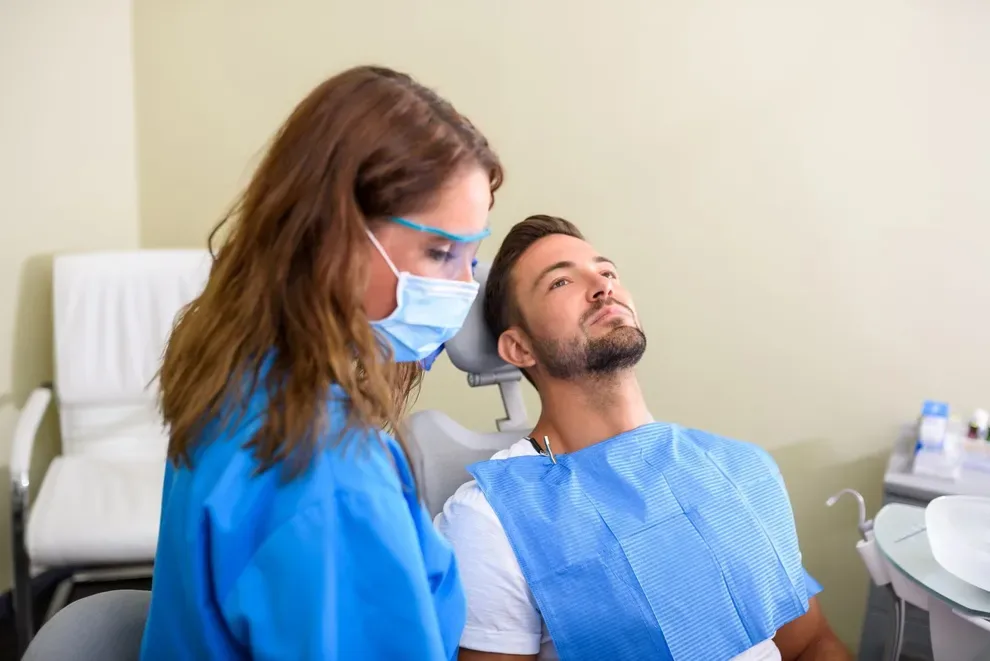Common Causes of Dry Mouth and How You Treat It

Table of Contents
- What is Dry Mouth?
- Common Causes of Dry Mouth
- Other Issues
- Treatment Options
- Preventing Dry Mouth
- References
Having a dry mouth often leads to oral hygiene problems, difficulty swallowing, bad breath and, for people that wear dentures, trouble putting them on.
Dry mouth is not a condition on its own. It is usually a side effect of an illness or condition. Most commonly, it is caused by certain medications.
What is Dry Mouth?
When your mouth doesn’t make enough saliva, you can experience a sensation known as dry mouth. Though it is rarely a sign of a serious illness, it can sometimes point to an underlying health condition.
Dry mouth (xerostomia) is a condition in which the mouth is not producing or retaining sufficient amounts of saliva. Saliva is vital for a healthy mouth. The lack of it can lead to tooth decay, not to mention an unpleasant sticky or dry feeling.
In most cases, dry mouth is only a symptom of a condition. It is often witnessed as a side effect of certain medications, such as antihistamines, decongestants, and chemotherapy.
Symptoms of dry mouth include:
A dry or sticky mouth
Grooved tongue
Bad breath
Altered taste
Difficulty swallowing, chewing, or speaking
Sore or hoarse throat
Thick, stringy saliva
Common Causes of Dry Mouth
Dry mouth occurs when the salivary glands are impeded from producing enough spit to keep the mouth moist. It can happen for various reasons:
There are hundreds of medications that produce the dry mouth effect, including prescription meds and over-the-counter drugs.
Drugs that are commonly associated with dry mouth are antihistamines, decongestants, and muscle relaxants. Some pain meds also cause dry mouth, so do certain medications for anxiety, depression, and high blood pressure.
Consuming alcohol and drugs like tobacco and methamphetamines can increase dry mouth symptoms. Methamphetamines are especially notorious for causing dry mouth that often leads to severe dental damage, a condition informally known as “meth mouth.”
Smoking, whether tobacco or marijuana, can also promote dry mouth.
Dry mouth is common in older adults as they’re more likely to be on medication. However, aging can contribute to dry mouth when it affects the body’s ability to assimilate medication. Aging also comes with long-term health problems and nutritional insufficiencies, which may exacerbate dry mouth symptoms.
Diabetes, stroke, and oral thrush are three prominent causes of dry mouth. The symptom is usually present in people with Alzheimer’s too. Dry mouth can be caused by autoimmune diseases, which is why some of its underlying causes are HIV/AIDS and Sjorgen’s syndrome.
In some cases, dry mouth is induced by breathing through your mouth, especially during sleep.
Nerve damage, especially in the head and neck region, can induce dry mouth.
The common forms of cancer therapy, chemotherapy, and radiation treatment can cause dry mouth. The drugs used in chemotherapy can affect saliva production significantly. Similarly, radiation can have a temporary or lasting effect on salivary glands when treatment is administered to the head or neck.
What Other Issues Can Dry Mouth Lead To?
A lack of sufficient saliva can have far-reaching implications on your overall health. Some of the complications that arise from untreated, dry mouth are:
The development of oral thrush, which is a yeast infection of the mouth
Mouth sores
Rapid tooth decay, plaque development, and gum disease
Cracked or split lips, especially at the corners
Malnutrition from poor feeding habits due to difficulty chewing and swallowing.
Joint pain
Treatment Options
Treatment for dry mouth serves three purposes: increasing saliva flow, preventing tooth decay, and addressing the underlying causes.
The healthcare professional first reviews the medication (if any) you’re currently on to establish the cause of the symptom. If your medication is the problem, the doctor might recommend the following:
Avoid taking your medication at night as dry mouth is more likely to cause tooth decay and cavities then.
Sip some water to moisten your mouth before swallowing tablets or capsules.
Steer clear of under-the-tongue medications whenever possible.
Opt for liquid formulas whenever possible.
Avoid decongestants and antihistamines whenever possible.
When it isn’t feasible to stop taking your current medication, your healthcare provider may prescribe drugs like Cevimeline (Evoxac) and Pilocarpine (Salagen).
The former is used to treat dry mouth syndrome in people with Sjogren’s syndrome, while the latter is used to increase saliva production naturally.
For extreme cases, such as in the case of damaged salivary glands, researchers are looking into ways to repair glands or replace them with artificial ones when medication can’t restore their saliva production.
You can take the following steps to treat dry mouth at home:
Brush twice a day and use mouthwash.
Try stimulating your salivary glands by sucking on popsicles, chewing sugar-free gum, or sipping water (or any other sugar-free drink) periodically.
Use artificial saliva stimulants such as OTC mouth rinses and sprays.
Apply lip balm to prevent dry, cracked lips. Install a cool-mist humidifier if you breathe with your mouth during sleep.
Stay away from alcohol, caffeine, and smoking.
Preventing Dry Mouth
Not all causes of dry mouth are preventable. However, there are ways to prevent some of the underlying causes. For instance:
Drinking plenty of water keeps you hydrated, and therefore your saliva production remains optimal.
Using a humidifier in your bedroom (if you breathe through your mouth) may reduce dry mouth at night.
Practicing how to breathe through your nose may prevent nighttime dry mouth.
Avoid decongestants, antihistamines, and other OTC drugs that can induce dry mouth.
Avoid excessive alcohol and drug use, especially if it involves smoking.
It is essential to practice good oral hygiene to keep dry mouth at bay. Even though the at-home remedies listed here may alleviate your discomfort, it is advisable to visit your dentist regularly to prevent long-term damage from dry mouth.
